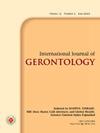How Do We Identify Older Adults at Risk of Dependency? Objective or Subjective Measures
IF 0.3
4区 医学
Q4 GERIATRICS & GERONTOLOGY
引用次数: 0
Abstract
world, the population of numerous countries continues to cross the threshold of different stages of aging: becoming firstly an aging society, then aged society, and finally, a super-aged society. Taiwan, for instance, is estimated to become a super-aged society in 2026. This aging tendency leads to the rising importance of cultivating a generation of robust elderlies, i.e., a healthy old population, for it will enable elder people to contribute their unique talent, which further ensures the rate of senior social engagement. Therefore, investing in health for frail old adults is a critical issue. The purpose of clinical care for frail people is to prevent disability and further improve their overall life quality. To achieve this aim, an objective multidisciplinary Comprehensive Geriatric Assessment (CGA) is applied. CGA includes the assessment of cognitive, mood, comorbidities, polypharmacy, falls, functional status of daily activities, nutritional and social support. As known, Geriatrics is a medical field that requires professionals to conduct a holistic assessment on elderlies, and a team to intervene in older adults at risk of dependency accordingly. The hope is that the early interventions and health investment made by the medical teams can collectively and effectively reduce the elderlies’ chance of disability, timely reversing their frailty. However, even though objective measures such as CGA can give reliable assessment results to assist medical professionals in identifying older adults who are at risk of dependency, the process of conducting a CGA is rather time-consuming and requires a great deal of professionalism as well as work, causing it to lack efficiency. Compared to objective measures such as the aforementioned CGA or Physical Performance Battery (PPB), subjective measures such as the “Self-Reported screening tool for older adults at risk of Dependency (SRD)” has become a pleasant alternative due to insufficient resources to conduct objective measures. With SRD, patients can reflect on their life experience and answer the health assessment questionnaire with the help of their caregivers, and report back to the medical professionals their health condition. In this case, considering the amount of time and labor saved, adopting SRD for assessment will undoubtfully boost the efficiency of the process to identify frail elderlies. Besides, Tanaka et al. present the effectiveness of two questions from a 25-question self-reported SRD that could predict the objective measures of PPB on the physical function among old adults. Since one of the major causes for elderlies to reduce to dependency is falls, the two questions are, therefore, “Have you experienced a fall in the past year?” and “Do you feel anxious about falling while walking?” Nevertheless, if necessary, medical professionals are free to apply other self-reported questionnaires with appropriate questions to identify older adults at risk of dependency. It is of utmost significance to construct a feasible and timeefficient method to confront the rocketing statistic of the elderly population. Compared to objective measures, subjective measures save both time and manpower, thus more satisfactorily answer the call to invest in health and prevent elderly dependency in a superaged society.我们如何识别有依赖风险的老年人?客观或主观测量
在世界范围内,许多国家的人口不断跨越老龄化的不同阶段:先进入老龄化社会,再进入老年社会,最后进入超老龄化社会。例如,据估计,台湾将在2026年成为一个超老龄化社会。这种老龄化趋势使得培养一代健壮的老年人,即健康的老年人口变得越来越重要,因为这将使老年人贡献他们独特的才能,从而进一步保证老年人的社会参与率。因此,投资于体弱多病的老年人的健康是一个关键问题。临床护理弱者的目的是预防残疾,进一步提高整体生活质量。为了实现这一目标,应用了客观的多学科综合老年评估(CGA)。CGA包括对认知、情绪、合并症、多种药物、跌倒、日常活动功能状态、营养和社会支持的评估。众所周知,老年病学是一个医学领域,需要专业人员对老年人进行全面评估,并需要一个团队对有依赖风险的老年人进行相应的干预。希望医疗团队的早期干预和健康投资能够共同有效地减少老年人的残疾机会,及时扭转他们的脆弱性。然而,尽管诸如CGA之类的客观措施可以提供可靠的评估结果,以协助医疗专业人员识别有依赖风险的老年人,但进行CGA的过程相当耗时,需要大量的专业知识和工作,导致效率低下。与上述CGA或Physical Performance Battery (PPB)等客观测量方法相比,“老年人依赖风险自我报告筛查工具(SRD)”等主观测量方法由于进行客观测量的资源不足,已成为一种令人愉快的替代方法。通过SRD,患者可以在照顾者的帮助下反思自己的生活经历并回答健康评估问卷,并向医疗专业人员报告自己的健康状况。在这种情况下,考虑到节省的时间和人力,采用SRD进行评估无疑会提高识别体弱老年人过程的效率。此外,Tanaka等人提出了25题自我报告SRD中的两个问题的有效性,这些问题可以预测PPB对老年人身体功能的客观测量。由于老年人减少依赖的主要原因之一是跌倒,因此这两个问题是,“你在过去一年中经历过跌倒吗?”和“你会因为走路时摔倒而感到焦虑吗?”然而,如有必要,医疗专业人员可以自由地使用其他自述问卷,其中包含适当的问题,以确定有依赖风险的老年人。构建一种可行的、及时有效的方法来应对急剧增长的老年人口统计具有重要意义。与客观措施相比,主观措施节省了时间和人力,从而更满意地回应了在超老龄化社会中投资健康和防止老年人依赖的呼吁。
本文章由计算机程序翻译,如有差异,请以英文原文为准。
求助全文
约1分钟内获得全文
求助全文
来源期刊
CiteScore
0.60
自引率
0.00%
发文量
0
审稿时长
6-12 weeks
期刊介绍:
The Journal aims to publish original research and review papers on all fields of geriatrics and gerontology, including those dealing with critical care and emergency medicine.
The IJGE aims to explore and clarify the medical science and philosophy in all fields of geriatrics and gerontology, including those in the emergency and critical care medicine. The IJGE is determined not only to be a professional journal in gerontology, but also a leading source of information for the developing field of geriatric emergency and critical care medicine. It is a pioneer in Asia.
Topics in the IJGE cover the advancement of diagnosis and management in urgent, serious and chronic intractable diseases in later life, preventive medicine, long-term care of disability, ethical issues in the diseased elderly and biochemistry, cell biology, endocrinology, molecular biology, pharmacology, physiology and protein chemistry involving diseases associated with age. We did not limit the territory to only critical or emergency condition inasmuch as chronic diseases are frequently brought about by inappropriate management of acute problems.

 求助内容:
求助内容: 应助结果提醒方式:
应助结果提醒方式:


